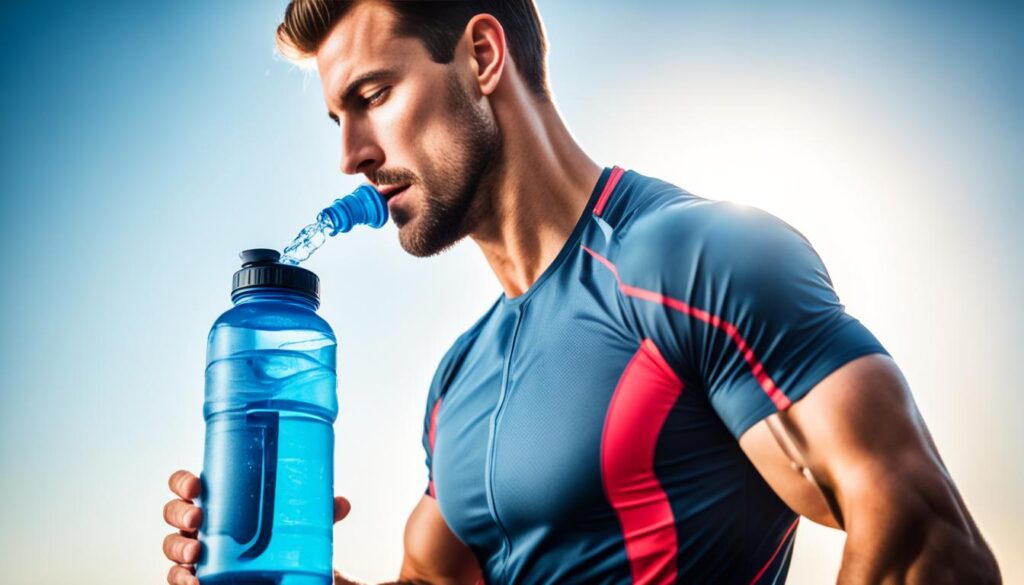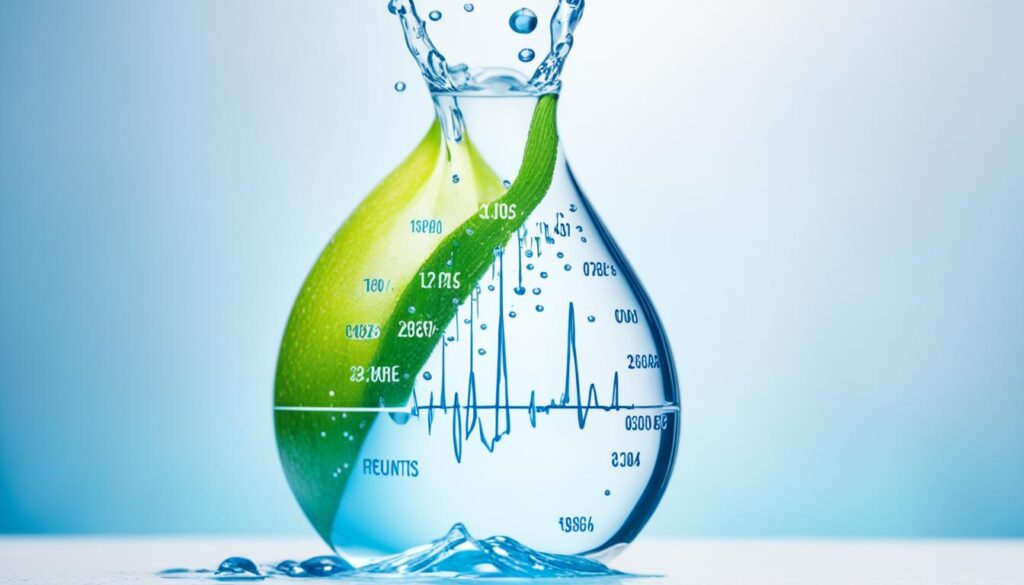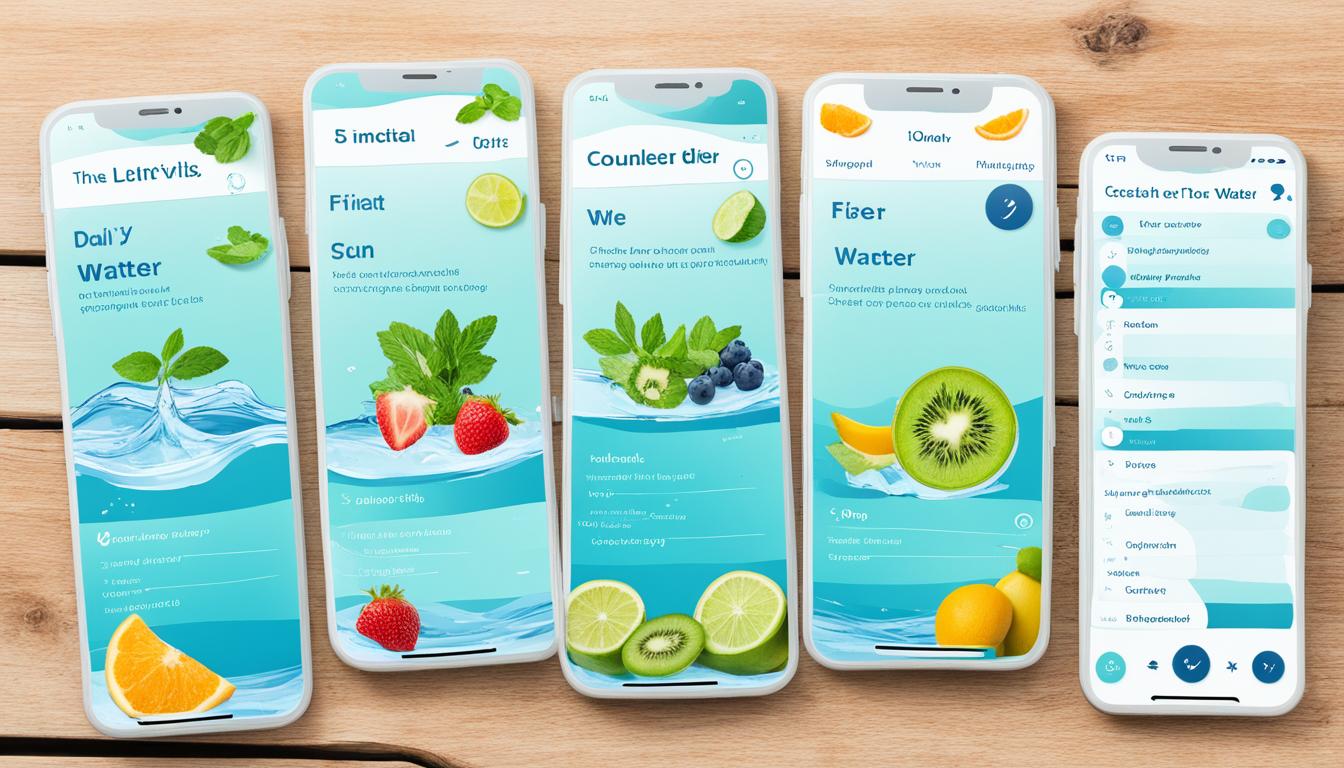Drinking enough water is key for good health, especially on a water diet. Our bodies are mostly water, so it’s important to keep up with fluid intake. This helps the heart pump blood better and muscles work well.
How much water you need changes based on things like the weather, what you wear, how hard you exercise, and your health. Men should try to drink 3.7 liters (about 16 cups) and women 2.7 liters (about 11 cups) daily. About 20% of our daily fluids come from food.
Being well-hydrated has many benefits. It helps control body temperature, break down food, manage hunger, keep joints lubricated, remove waste, and make saliva. But, drinking too much water can be harmful, especially for people with heart issues or electrolyte problems.
Key Takeaways
- Adequate water intake is vital for overall health and well-being
- The body is made up of 60% water, highlighting the importance of hydration
- Daily water requirements vary based on factors like climate, clothing, and physical activity
- Proper hydration supports heart health, muscle function, and other bodily processes
- Both insufficient and excessive water consumption can pose health risks
Understanding the Importance of Hydration on the Water Diet
Drinking enough water is key for good health, especially on the Water Diet. It keeps your body working right, supports your heart, and helps your muscles perform well. When you’re hydrated, you feel energized and focused all day.

How Proper Hydration Supports Heart Health
Drinking enough water is vital for a healthy heart. It makes your heart work less hard to move blood around. This is because water keeps blood volume and thickness right, helping your heart do its job well.
Dehydration can make your blood vessels narrow, raising your blood pressure. Drinking enough water keeps your blood vessels wide, helping you avoid heart disease and stroke.
The Role of Water in Maintaining Efficient Muscle Function
Water is crucial for your muscles to work well, especially when you’re active. When you exercise, you sweat and lose fluids. Drinking enough water helps keep your body cool, so your muscles can work right.
Not drinking enough water can make your muscles cramp, get tired, and feel weak. But when you’re hydrated, your muscles work better, making you stronger and more able to perform. It also helps you recover faster after working out.
Dehydration can cause dizziness, fatigue, swollen feet, headaches, and even life-threatening illnesses like heat stroke. Severe dehydration can lead to impaired kidney function, unbalanced electrolytes, and other complications.
To avoid dehydration and its bad effects, drink plenty of fluids every day. The Water Diet suggests drinking water as your main drink because it has no calories and hydrates you well. By drinking enough water, you help your heart and muscles stay healthy and support your overall well-being on the Water Diet.
Determining Your Daily Water Intake Needs
Starting a water diet means knowing how much water your body needs. Men should aim for about 3.7 liters (15.5 cups) of fluids daily. Women should aim for 2.7 liters (11.5 cups). But, your body’s needs can change based on many things.

Factors Influencing Water Requirements: Climate, Clothing, and Exercise Intensity
Your need for water changes with your environment, what you wear, and how active you are. If you live in a hot, humid place or wear heavy clothes, you’ll lose more water through sweat. You’ll need more fluids to stay hydrated.
Doing a lot of exercise or being active for a long time also means losing fluids. You’ll need to drink more water to refill what you lost and keep your electrolytes balanced.
To figure out how much water you need, use a hydration calculator. It looks at your age, gender, weight, activity level, and where you live. This can give you a better idea of how much water you should drink each day.
“Drink more water. Your skin, your hair, your mind and your body will thank you.”
– Anonymous
Special Considerations for People with Medical Conditions or on Certain Medications
If you have certain health issues or take certain medicines, your water needs might be different. For example:
- People with diabetes, heart disease, or cystic fibrosis may need to drink more water to help manage their conditions and maintain proper hydration.
- Some medications, such as diuretics, can increase urination and fluid loss, necessitating higher water intake to compensate for the additional fluid loss.
- Pregnant and breastfeeding women may need to increase their daily water intake to support fetal development and milk production.
If you have health issues or take medicines that affect your fluid needs, talk to your doctor. They can help you figure out how much water you should drink each day.
| Age Group | Daily Fluid Intake Recommendation (Liters) |
|---|---|
| Children aged 4-8 years | 1.2 |
| Men aged 19-30 years | 3.7 |
| Women aged 19-30 years | 2.7 |
| Men aged 31-70+ years | 3.7 |
| Women aged 31-70+ years | 2.7 |
| Pregnant women | 3.0 |
| Breastfeeding women (0-6 months postpartum) | 3.8 |
These are just basic guidelines. Pay attention to how your body feels and adjust your water intake as needed. Use tools like a hydration calculator to make sure you’re drinking enough water each day. This will help you meet your health goals while following the water diet.
Monitoring Hydration Levels: Signs and Symptoms
Staying hydrated is key for good health, especially with the water diet. Feeling thirsty is a sign you might be getting dehydrated. It’s important to watch for other signs too.
Checking your urine color is a good way to see if you’re drinking enough water. If it’s pale and clear, you’re good. But if it’s dark or amber, you might need more water. Watching your urine color helps you know if you’re hydrated.
Other signs you might be getting dehydrated include:
- Muscle cramps
- Bad breath
- Fatigue
- Fever or chills
- Craving sweets
- Dry mouth and skin
- Fast heartbeat
- Irritability and confusion
- Drowsiness
Not sweating during hard exercise can be a warning sign of dehydration or heat exhaustion. If this happens, stop, rest, and drink water right away to avoid problems.
| Symptom | What It Means |
|---|---|
| Dark urine | Increased dehydration |
| Dry mucus membranes in the mouth | Early sign of dehydration |
| Thirst | Body’s signal to drink more water |
| Absence of sweat during intense exercise | Severe dehydration, risk of heat exhaustion |
By watching for these signs, you can keep an eye on your hydration and act fast if needed. Remember, staying hydrated is ongoing. Always listen to your body and drink water regularly to stay healthy on the water diet.
Best Practices for Staying Hydrated on the Water Diet
To stay hydrated on the water diet, choose wisely about what you drink and eat. Drink water first because it’s the best way to keep your body working well. Try to drink water all day, not just in big gulps. Use a reusable water bottle to remind you to drink enough healthy fluids.
Incorporating Water-Rich Foods into Your Diet
Eat foods high in water to help with hydration. Many fruits and veggies are full of water, making them great for the water diet. Think of eating watermelon, strawberries, cantaloupe, peaches, pineapples, cucumbers, leafy greens, radishes, celery, zucchini, and tomatoes. These foods not only help you stay hydrated but also give you important nutrients and fiber for your health.
Timing Your Water Intake: Before, During, and After Physical Activity
When you’re going to exercise or be outside in the sun, drink water first. Keep drinking water every 15-20 minutes while you’re active to replace what you lose. After working out, drink water or a sports drink with low sugar to refill your electrolytes. How much water you need can change based on the weather, what you wear, and how hard you’re exercising. Pay attention to how thirsty you feel and drink accordingly.
By doing these things and making water your main drink, eating foods with lots of water, and drinking at the right times, you can do well on the water diet. Staying hydrated helps with your physical performance, health, and even makes your skin look better, your digestion work better, and your mind clearer. Let water be your ally and enjoy how it makes you feel.




